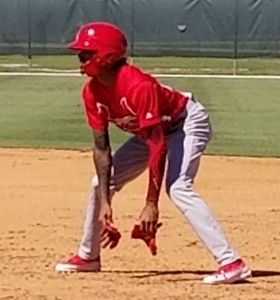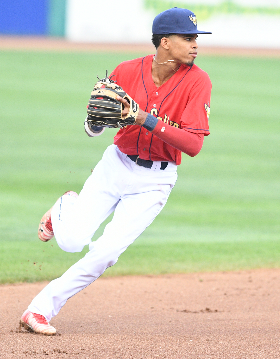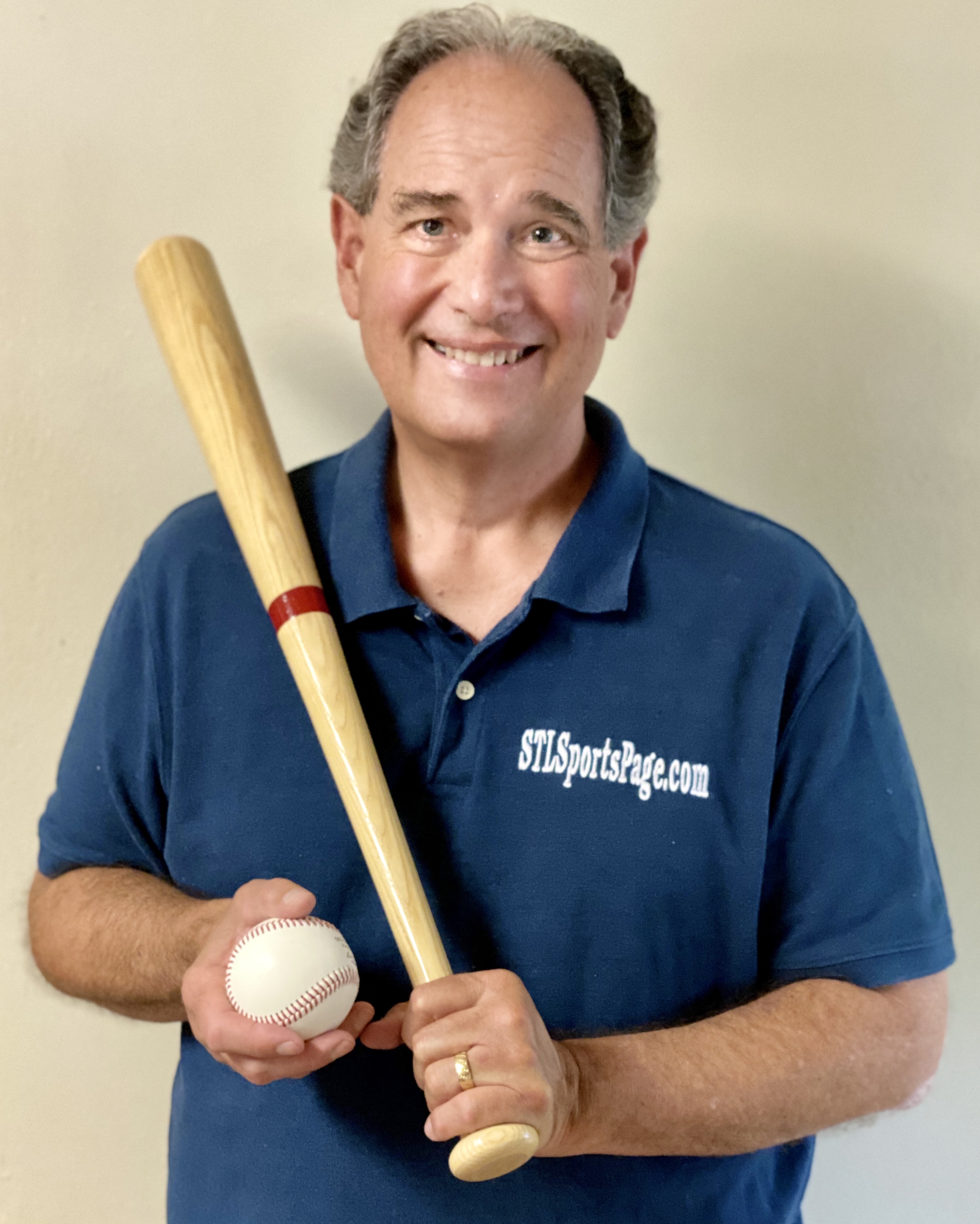
By Rob Rains
JUPITER, Fla. – As he fields ground balls on one of the back fields at the Cardinals’ spring training complex with other minor leaguers, the skills that scouts first saw from Delvin Perez more than three years ago are still on display.
There is the lateral range from his shortstop position, helped by his above-average speed. There are his quick hands, and his strong, accurate arm — the skills that made him a first-round draft pick.
“Some of the things he did on the field you were like, ‘Wow, that’s a pretty talented young man,’” said Joe Kruzel, his manager last season in State College, Pa. “He’s very gifted as a shortstop.”
It was those gifts which prompted the Cardinals to use the 23rd overall pick in the 2016 draft on the then 17-year-old Perez, who was projected as a top 10 pick before it was revealed shortly before the draft that he had tested positive for performance enhancing drugs.
 After doing their due diligence, the Cardinals believed Perez had made an innocent, teen-age mistake and had not intentionally taken an illegal substance. As other teams made their first selections that night and passed on Perez there was a growing feeling in the team’s war room that Perez could fall to them.
After doing their due diligence, the Cardinals believed Perez had made an innocent, teen-age mistake and had not intentionally taken an illegal substance. As other teams made their first selections that night and passed on Perez there was a growing feeling in the team’s war room that Perez could fall to them.
“The package of tools is something that is rarely available at that spot,” said Randy Flores, then in his first year as the Cardinals’ scouting director. “For the potential and the risk and the amount of draft picks we had the year (three of the top 34 in the draft) it’s an opportunity that rarely exists.”
Even before the positive drug test, in its pre-draft scouting report, Baseball America labeled Perez as “one of the biggest risk-reward players in the class.”
The Cardinals took the risk. They are hoping this is the year they finally start seeing the reward.
Looking for commitment
The Cardinals have spent the last three years wanting, and waiting, for Perez to do the one thing his raw skills alone can’t accomplish – make a commitment to get better, to become the player many in the organization still believe he can become.
“His future is bright, but he needs to commit,” said Jose Oquendo, who has become a father-figure to Perez. “He needs to commit to spending time in the cages. He needs to spend time eating the right food so he can put on the pounds he needs. He has to commit in the weight room and outside the stadium.
“The last couple of years that is what we have talked about and he always finds a way to skip here and there, like a typical kid, but he needs to grow up a little bit more. There’s plenty of time, but time is running. He’s got time, but he needs to commit. Hopefully this is the year he does it.”
Oquendo is not saying anything publicly that he has not told Perez in private, and after admitting that he lost his focus for much of the last two years, the message might finally be getting through to Perez.
 “I just need to find myself again and play like I did in Puerto Rico (as an amateur) and during my first season,” Perez said through team interpreter Carlos Villorai. “I just need to focus and start over.
“I just need to find myself again and play like I did in Puerto Rico (as an amateur) and during my first season,” Perez said through team interpreter Carlos Villorai. “I just need to focus and start over.
“I have to forget about distractions. When distractions come in everything starts to go sideways. … First I have to admit I was doing something wrong, and with the help of my dad and Oquendo, they are a big part of how I am trying to make those adjustments. I want to just turn the page.
“I think all of the distractions took me away from my path. That’s what I want to get back.”
Perez did not offer any specifics about the distractions the past two years, but his manager last season, Kruzel, does have at least one opinion about why Perez did not have more success in State College.
“It’s not easy to play this game, and it’s not easy to play when you don’t feel like you are playing up to your expectations, let alone what other people feel,” Kruzel said. “I don’t think any young player wants to fail. They see guys in the big leagues and they want to get there quicker than the process sometimes dictates. Sometimes the journey is a little more difficult.
“Sometimes we live in a microwave oven era. When you cook the turkey for Thanksgiving they don’t want to put it in the oven for six hours. They want faster results. That’s the generation we are living in.”
Even though Perez will play this entire season at the age of 20, some have been quick to label his selection as a bust because he has yet to play a game in a full-season league, and hit just .213 last season in the New York-Penn League. Patience, especially in waiting for young prospects to put it all together, is a skill many in the game – from fans to the front office – often lack.
“Every player has a different development plan,” said Gary LaRocque, the Cardinals’ director of player development. “They are in the minor leagues for a reason. We try to individualize the plan, and you have to have a lot of patience. It doesn’t happen overnight for any player. He (Perez) is like most 18 to 20-year-old players. He has to learn the responsibility that goes along with playing the game.”
When Oquendo talks about wanting to see that recognition from Perez, he brings up the name of Jordan Hicks. The light bulb went off for Hicks last season and the results followed in what has become a well-known story.
“It’s not just him; there are a lot of kids that need to make that commitment,” Oquendo said. “Jordan Hicks made a good commitment to himself and to his profession. He made the switch and that’s why he is in the big leagues.
“We can find all kinds of excuses. Struggling is not an excuse. You have to keep plugging away and find solutions to get better.”
Kruzel looked at Perez last season as if he was a student in a classroom.
“If you have 20 kids in a classroom they are all going to learn at a different pace, or in different settings,” Kruzel said. “Some guys are audio learners. Some are visual learners. We have to find a way not just with him but with everybody what it is that makes them learn and makes them tick. We have to utilize that information to get the most out of them.”
In Perez’s case, what Kruzel hopes begins to happen this year is that Perez focuses more on what he does well on the field instead of thinking about where he struggles. Emphasizing the positive could minimize the attention on the negative, he believes.
“If we can get players to understand what it is they do well, then they can get into a position where they are a little more comfortable and then you might see a big jump in the numbers,” Kruzel said. “What players do to themselves is they get down on themselves too quickly and then it’s tough to get them out of that situation. They created the situation and make it worse than it is.
“We have to tell players ‘Here’s what you do well. Keep doing it. It’s what got you here. Don’t worry about mistakes. Focus on all of the good things you do.’
“It’s a very tough game. You can look up at the scoreboard and see what you’re hitting. You see what your numbers are. We have a collective grouping of players today who want instant feedback and instant results and sometimes the journey doesn’t allow for them to have that kind of success right away.
“The strides that he made last year were in the right direction. His defense improved, his baserunning was good. I just hope he continues to move in that direction. Everything he did last year in my opinion was a step in the right direction. We’ll see if he can maintain that.”
“The most important year of my career”
Perez’s professional career resume includes 141 games and 520 at-bats, statistics that can be measured in black and white, as well as his composite career .237 batting average. It’s what is not as obvious on that resume, however – such as the lessons he has learned – which will dictate where Perez’s career goes from here.
“I’ve come a long way,” Perez said. “From now on I just want to focus and be at my best. There are things you can measure from stats but it’s not only stats; you have to be aware of everything that is going on.
“I’m going to get back on track where everything is going to be OK. It’s definitely something that helps you grow and think for the future. Having gone through the situations you know what to do and what not to do. I really appreciate having that experience so I can avoid that side and keep working on the good side and avoid distractions.
“I think this is the most important year of my career. I need to demonstrate that I can play baseball and can be a great player, at the top of my game. This is a big year for me to help me have the commitment to do what it takes to get to the next level.”
One of the reasons Perez wants to succeed is the faith that Oquendo, and Cardinals’ catcher Yadier Molina, have shown in him since the fellow Puerto Rico native joined the organization.
“Jose has helped me a lot in all aspects of life, not just on the field but things off the field,” Perez said. “Yadi has given me good advice too.
“They are seeing something in me that I can be something more, that I can be a better player. I’m trying to take that as inspiration to keep working hard.”
Oquendo is happy that Perez made that comment, but he is more looking forward to seeing Perez actually do it instead of merely talk about it.
“There is always going to be somebody who tries to test the waters,” Oquendo said. “You have to give them the best advice and be there when they need something.
“He’s a great kid. He’s bright, he’s got a future. But he needs to understand what being a professional is all about. He has to know what he is doing and what everybody else is doing. I just want to see him work.”
 While the expectations likely were that Perez would already be playing at a higher level by now, the reality is that he is not that far behind other members of his draft class. Of the 22 players selected before Perez in the 2016 draft, including 10 college picks, none have made it to the majors.
While the expectations likely were that Perez would already be playing at a higher level by now, the reality is that he is not that far behind other members of his draft class. Of the 22 players selected before Perez in the 2016 draft, including 10 college picks, none have made it to the majors.
Only two players picked anywhere in the first round that year, including the Cardinals’ Dakota Hudson, have played in the majors.
As Flores looks back at that draft, now with three years of hindsight and two additional drafts under his belt, he is asked if given the same scenario again that developed that night, would be make the same pick?
The answer is yes.
“If a player has spent most of the year as a top 10 pick and he falls to us, would we handle it the same?,” Flores said. “I would say yeah, that happens almost every year. You have to be ready for it. … I would not be gun shy if I thought that was the right pick for us, given the situation.”
The Cardinals knew that following the 23rd pick, they had two more picks coming later in the first round, and used those on Hudson and high school outfielder Dylan Carlson, who has had an impressive spring as a non-roster player in the major-league camp.
In fact, of the top nine players the Cardinals picked that year in Flores’ inaugural draft, one has reached the majors – Hudson – and five more were in the major-league camp either because they were on the 40-man roster or earned non-roster invitations. Of the other three players, one (Zac Gallen) was traded and one (Walker Robbins) has changed positions, working now as a pitcher. The other was Perez.
“I look at him now as a player who would be a college junior, and a young college junior, coming into this year’s draft,” Flores said. “It’s just so early. As we all know there are still chapters to be written with Delvin. I’m looking forward to the next chapters.”
So is Perez.
“I’m in the right place; where I want to be,” Perez said. “We’ll start from here.”
Follow Rob Rains on Twitter @RobRains
State College photo by Steve Manuel




